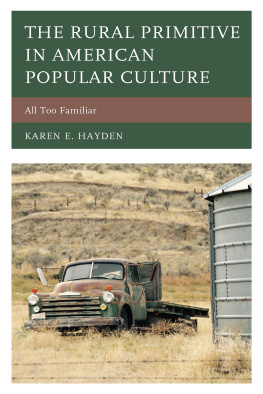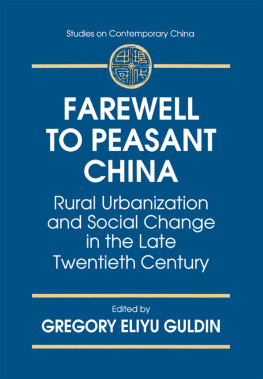
Rural China, 19011949
Highlighting the interwoven relationship between Chinese rural society and larger historical forces, this book charts the evolution of Chinas rural society from 1901 to 1949, concentrating on the major changes of this period and the scenarios developed to modernize rural society during the half century leading up to the Revolution.
The modern history of rural China is one of sweeping institutional and structural transformation across many dimensions. As the first half of the twentieth century unfolded, against a backdrop of turbulent changes across a country that underwent industrialization, urbanization and modernization, Chinas agriculture, rural population and rural communities encountered many crises, but also showed remarkable resilience and capacity for adaptation and reform. In each of the six chapters, the author delves into one aspect or examines one period of this massive transformation, and identifies the social, economic, political and cultural significance of these tumultuous processes at work.
The book will appeal to both scholars and general readers interested in modern Chinese history and the transformation of rural China.
Wang Xianming is currently a professor in the History Department at Nankai University. His interests lie in the teaching and research of modern Chinese social history, cultural history and rural history, and he has received several national and ministerial achievement awards.
China Perspectives
The China Perspectives series focuses on translating and publishing works by leading Chinese scholars, writing about both global topics and China-related themes. It covers Humanities & Social Sciences, Education, Media and Psychology, as well as many interdisciplinary themes.
This is the first time any of these books have been published in English for international readers. The series aims to put forward a Chinese perspective, give insights into cutting-edge academic thinking in China, and inspire researchers globally.
Titles in sociology currently include:
Social Structure and Social Stratification in Contemporary China
Lu Xueyi
Social Construction and Social Development in Contemporary China
Lu Xueyi
Economic Transition and Peoples Livelihood: China Income Distribution Research
Zhao Renwei
Economic Transition and Peoples Livelihood: China Economic Transition Research
Zhao Renwei
Academic Experiences of International Students in Chinese Higher Education
Mei Tian, Fred Dervin and Genshu Lu
Rural China, 19011949
Modernization and Resilience
Wang Xianming
The Complexity of Rural Migration in China
The Story of a Migrant Village
Xiong Fengshui
Revisiting Chinas Rural Urbanisation
A Pearl River Delta Region Perspective
Daming Zhou
For more information, please visit www.routledge.com/China-Perspectives/book-series/CPH
Rural China, 19011949
Modernization and Resilience
Wang Xianming
The publication of this book is sponsored by the Chinese Fund for the Humanities and Social Sciences
First published in English 2021
by Routledge
2 Park Square, Milton Park, Abingdon, Oxon OX14 4RN
and by Routledge
52 Vanderbilt Avenue, New York, NY 10017
Routledge is an imprint of the Taylor & Francis Group, an informa business
2021 Wang Xianming
Translated by Chen Qiang
The right of Wang Xianming to be identified as author of this work has been asserted by him in accordance with sections 77 and 78 of the Copyright, Designs and Patents Act 1988.
All rights reserved. No part of this book may be reprinted or reproduced or utilised in any form or by any electronic, mechanical, or other means, now known or hereafter invented, including photocopying and recording, or in any information storage or retrieval system, without permission in writing from the publishers.
Trademark notice: Product or corporate names may be trademarks or registered trademarks, and are used only for identification and explanation without intent to infringe.
English Version by permission of Social Sciences Academic Press (China).
British Library Cataloguing-in-Publication Data
A catalogue record for this book is available from the British Library
Library of Congress Cataloging-in-Publication Data
A catalog record has been requested for this book
ISBN: 978-0-367-63061-4 (hbk)
ISBN: 978-0-367-63067-6 (pbk)
ISBN: 978-1-003-11200-6 (ebk)
Typeset in Times New Roman
by Newgen Publishing UK
Contents
Since 2000, issues related to agriculture, rural areas and rural population have been put in the spotlight. While these are very much current problems, they have origins in an earlier era. We can trace the emergence, development and evolution of these problems, with which the Chinese people have been preoccupied throughout the nations modernization process, across a historical trajectory. There was a great deal of academic interest among thinkers and scholars in the 1930s in issues related to social changes in rural China against the backdrop of industrialization and urbanization. In addition, exploring and seeking answers to this issue from different perspectives also played an important part in the development of Chinese history since modern times. Looking back on our history, only if we consider this issue against the background of Chinese modern history can we figure out the underlying causes of its formation and the trends for its development, and understand its characteristics of the times in the dynamic process.
A theoretical debate over rural development in China that has waxed and waned since its beginning almost a hundred years ago has left its own historical imprint. Scholars with different social, political and academic backgrounds have different academic viewpoints and theoretical knowledge on the issue of how to observe rural society and choose a path for Chinas social development. However, they have a common goal, that is, to try to deepen their understanding of Chinas rural society and then modernize and revive the rural society based on their understanding. It is these various theories and different opinions that form the ideological premise for us today to re-examine the trend of rural development theory, because they may gather together to build social consensus or accumulate as rational resources.
At the turn of the twentieth century, there was a rising trend for supporting the revolution, and finally democratic republicanism replaced autocratic imperial power, which ushered in a new era in Chinese history. During this period, the change in the history of rural society didnt completely synchronize with the change in political revolutions or power at the upper levels. Instead, it has other historical characteristics. This chapter not only reveals the internal connection between revolutions and rural areas and the trend of development from the perspective of mass uprising in rural areas and changes in the rural public property system, but also discusses revolutions in-depth impact on rural social change after the revolutions veered from modernity to tradition.







